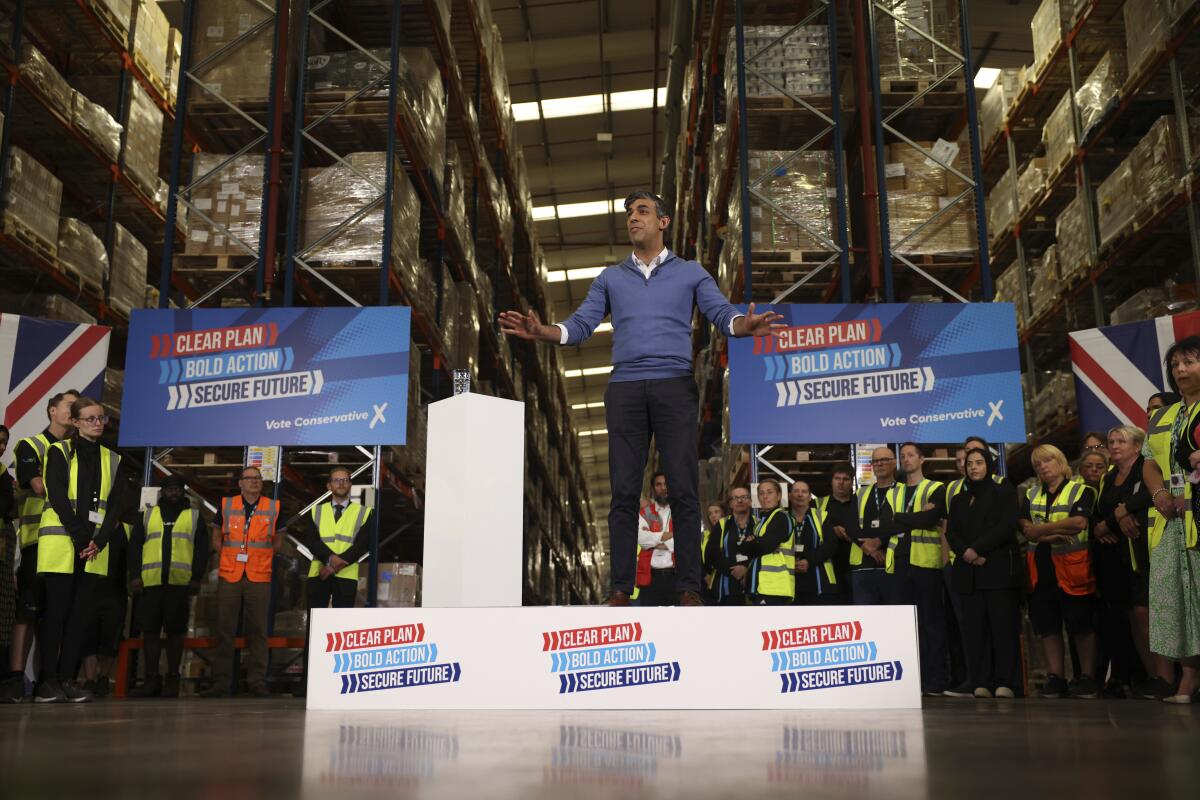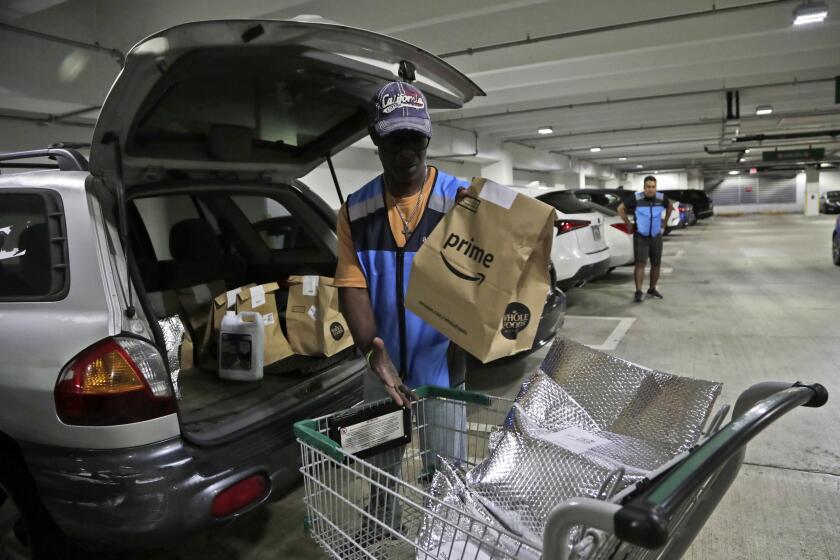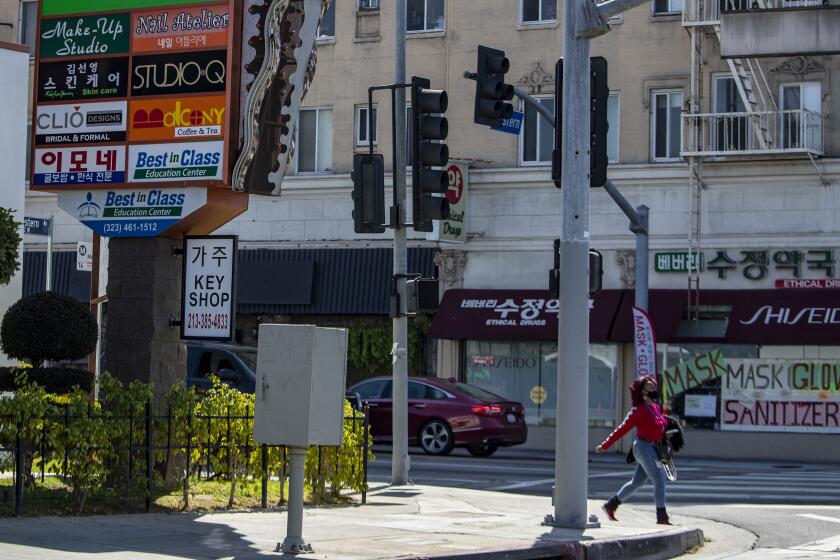Opinion: Will millennials decide this year’s elections in the U.K., U.S. and elsewhere?

- Share via
Come Thursday, millennials’ status as the “unluckiest generation” could finally turn in the U.K. For the first time in history, 28- to 43-year-olds in Britain will make up the largest group of eligible voters — the kind of muscle that could decide the result. Too bad generational apathy could torpedo that chance completely.
Since 1974, the turnout of 25- to 45-year-old voters in England and Wales has fallen from approximately 72% to 58%. A majority of millennials who voted between 2010 and 2019 saw their candidate lose in four elections and lost their bid against the Brexit referendum to leave the European Union. (A typical boomer voter born in 1955, meanwhile, will have backed every winner in the past 50 years.)
The election’s expected booting out of Britain’s Conservative party would end 14 years of rule. Economic discontent and immigration top voter concerns.
Consistent failure has inspired not action but lethargy. The prospect of an election win has become an elusive target for many in this generation, much like getting a job with a decent wage, buying a home or starting a family — nonnegotiable markers of adulthood for previous generations but not for this one. Yes, apathy risks a fifth consecutive election loss and potentially the most catastrophic results yet for this cohort should the ruling Conservative Party, which has shunted younger voters to the bottom of the pile for 14 years, succeed.
But, as is the case for millennials in rich nations globally, electoral detachment appears to supersede fear of the consequences.
An October 2020 report based on data from almost 5 million respondents in more than 160 countries showed that “young people’s faith in democratic politics is lower than any other age group, and millennials across the world are more disillusioned with democracy than Generation X or Baby Boomers were at the same age.” A few weeks later, that was evident at the polls in the U.S., where only 55% of 25- to 44-year-olds could muster the enthusiasm to vote in an election with the highest overall turnout since 1900. In 1964, 69% of the age group turned out.
These numbers appear at odds with the volume at which this generation broadcasts its opinions. There are marches in the streets and T-shirts and infinite hashtags for climate change, Ukraine and the Middle East; for Black Lives Matter and Pride. Politically engaged? No doubt about it. Electorally disengaged? Ditto.
I’ve struggled with freelance employment as a norm for my generation, as well as the lack of support for U.S. parents and caregivers.
There is an obvious disconnect at play. People vote for one of two reasons: to change things for the better or to keep them as they are. Neither applies to millennials, whose trust in the system has been eroding since they entered adulthood in a recession and has followed a steep descent from there.
There is no job security for this famously job-hopping generation, whose members have moved roles at a rate three times higher than other age groups to retain stagnant paychecks. From 1981 to last year, the average age of buying a home in the U.S. went from 29 to 35 (the average price went from $80,900 to $521,900 over the same period); the average college debt is $38,787.
Across the U.S. and the broader West, slim finances mean having children later. The likelihood of retiring with enough good years to spare — and affording them, along with the extra years of ill health that await ... yeah, good luck with that.
And so members of this “lost generation” (millennials have at least racked up many nicknames) — the first in U.S. history to be downwardly mobile — have yet to see a world in which the system is on their side, or how it could be, given the obstacles ahead.
We were first-generation Latina home buyers seeking to get our family out of a crowded 450-foot apartment. Here’s how our housing search went.
It’s a perverse truism that society’s youngest, who have the most to gain from voting, have always turned out the least. There have been efforts to address that, such as the “Rock the Vote” campaign — but in a twist, Gen Z might prove more plugged in than the generation that precedes them. Though often dismissed as being too hooked on TikTok and marinating in social anxiety to engage, in the U.S., these youngest adults voted in near-identical numbers in 2020 as they did 60 years earlier (though their attendance has fluctuated more widely over that period).
Gen Z turnout at the 2022 midterms was higher than that of both millennials and Gen Xers when they were the same age, per Census Bureau data. And in November, 40.8 million 18- to 27-year-olds will be eligible to cast their vote. It’s entirely possible that, as with socks above the ankle and laminated eyebrows, Gen Z will set a new trend among younger voters.
Young cohorts turning out is important: Polls currently put Donald Trump and Joe Biden close together, making a few percentage points meaningful. Meanwhile, in the U.K., if young voters were to mark their ballots in force along the expected lines, they would cement the first win for the Labour Party since 2010 — picking Keir Starmer over the Conservative Prime Minister Rishi Sunak. (Plus they’d enjoy the benefit of learning what winning an election feels like.)
Will it happen and bring about a new era of change? To use a millennialism: Meh. Just as politics have failed to make under-44s a priority, in Britain this week, that’s likely to cut both ways.
Charlotte Lytton is a journalist based in London.
More to Read
A cure for the common opinion
Get thought-provoking perspectives with our weekly newsletter.
You may occasionally receive promotional content from the Los Angeles Times.













